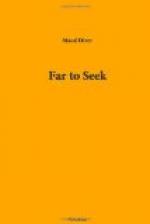And all the others seemed farther still. They wrote regularly, affectionately. Yet their letters—especially his father’s—seemed to tell precious little of the things he really wanted to know. Perhaps his own had been more reserved than he realised. There had been so much at Jaipur and Delhi that he could not very well enlarge upon. No use worrying the dear old man; and she, who had linked them, unfailingly, was now seldom mentioned between them.
So there grew up in Roy a disconsolate feeling that none of them cared very much whether he came Home or not. Jerry—after three years in a German prison—was a nervous wreck; still undergoing treatment; humanly lost, for the time being. Tiny was absorbed in her husband and an even Tinier baby, called Nevil Le Roy, after himself. Tara was not yet home; but coming before long, because Aunt Helen had broken down, between war work and the shock of Atholl’s death.
A queer thing—separation, mused Roy, as Suraj slowed down to a walk and the glare of morning flamed along the sky. There were they—and here was he: close relations, in effect; almost strangers in fact. There was more between him and them than several hundred miles of sea. There was the bottomless gulf of the War; the gulf of his bitter grief and the slow climb up from the depths to Pisgah heights of revelation. Impossible to communicate—even had he willed—those inner, vital experiences at Chitor and Jaipur. And he had certainly neither will nor power to enlarge on his present turmoil of heart and mind.
Since his ride with Rose Arden, after the dinner-party, things seemed to have taken a new turn. Their relation was no longer tentative. She seemed tacitly to regard him as her chosen cavalier; and he, as tacitly, fell in with the arrangement. No denying he felt flattered a little; subjugated increasingly by a spell he could neither analyse nor resist, because he had known nothing quite like it before. He was, in truth, paying the penalty for those rare and beautiful years of early manhood inspired by worship of his mother. For every virtue, every gift, the gods exact a price. And he was paying it now. Deep down within him, something tugged against that potent spell. Yet increasingly it prevailed and lured him from his work. The vivid beings of his brain were fading into bloodless unrealities; in which state he could do nothing with them. Yet Broome’s encouragement, and his father’s critical appreciation of fragments lately sent Home, had fired him to fulfil—more than fulfil—their expectations. And now—here he was tripped up again by his all-too-human capacity for emotion—as at Jaipur.




